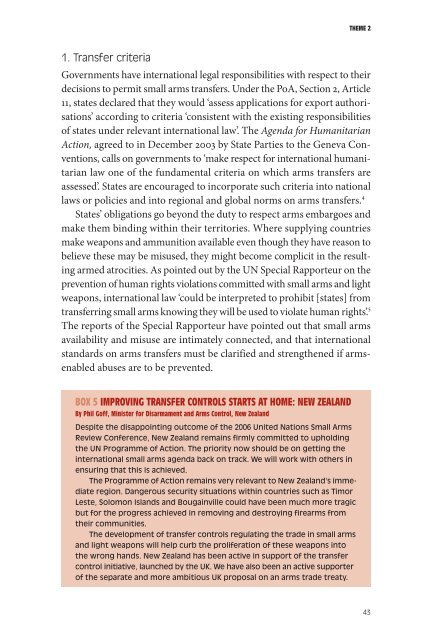MISSING PIECES - Inter-Parliamentary Union
MISSING PIECES - Inter-Parliamentary Union
MISSING PIECES - Inter-Parliamentary Union
Create successful ePaper yourself
Turn your PDF publications into a flip-book with our unique Google optimized e-Paper software.
THEME 2<br />
1. Transfer criteria<br />
Governments have international legal responsibilities with respect to their<br />
decisions to permit small arms transfers. Under the PoA, Section 2, Article<br />
11, states declared that they would ‘assess applications for export authorisations’<br />
according to criteria ‘consistent with the existing responsibilities<br />
of states under relevant international law’. The Agenda for Humanitarian<br />
Action, agreed to in December 2003 by State Parties to the Geneva Conventions,<br />
calls on governments to ‘make respect for international humanitarian<br />
law one of the fundamental criteria on which arms transfers are<br />
assessed’. States are encouraged to incorporate such criteria into national<br />
laws or policies and into regional and global norms on arms transfers. 4<br />
States’ obligations go beyond the duty to respect arms embargoes and<br />
make them binding within their territories. Where supplying countries<br />
make weapons and ammunition available even though they have reason to<br />
believe these may be misused, they might become complicit in the resulting<br />
armed atrocities. As pointed out by the UN Special Rapporteur on the<br />
prevention of human rights violations committed with small arms and light<br />
weapons, international law ‘could be interpreted to prohibit [states] from<br />
transferring small arms knowing they will be used to violate human rights’. 5<br />
The reports of the Special Rapporteur have pointed out that small arms<br />
availability and misuse are intimately connected, and that international<br />
standards on arms transfers must be clarified and strengthened if armsenabled<br />
abuses are to be prevented.<br />
BOX 5 IMPROVING TRANSFER CONTROLS STARTS AT HOME: NEW ZEALAND<br />
By Phil Goff, Minister for Disarmament and Arms Control, New Zealand<br />
Despite the disappointing outcome of the 2006 United Nations Small Arms<br />
Review Conference, New Zealand remains firmly committed to upholding<br />
the UN Programme of Action. The priority now should be on getting the<br />
international small arms agenda back on track. We will work with others in<br />
ensuring that this is achieved.<br />
The Programme of Action remains very relevant to New Zealand’s immediate<br />
region. Dangerous security situations within countries such as Timor<br />
Leste, Solomon Islands and Bougainville could have been much more tragic<br />
but for the progress achieved in removing and destroying firearms from<br />
their communities.<br />
The development of transfer controls regulating the trade in small arms<br />
and light weapons will help curb the proliferation of these weapons into<br />
the wrong hands. New Zealand has been active in support of the transfer<br />
control initiative, launched by the UK. We have also been an active supporter<br />
of the separate and more ambitious UK proposal on an arms trade treaty.<br />
43
















